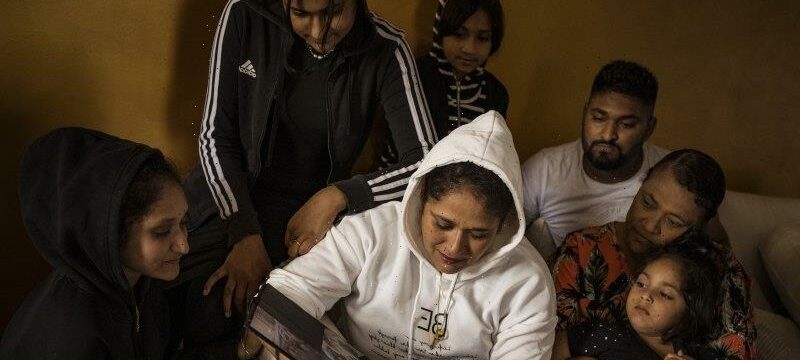Jasmin Hussein struggles to hold back the emotion as she remembers the October night her teenage daughter Alisha died in the back of their car, unable to breathe.
She was forced to drive her asthmatic daughter to hospital as they waited more than 15 minutes for their triple-zero call to connect to an emergency operator.
Jasmin Hussein’s daughter Alisha, 14, died during an asthma attack last October while waiting for an ambulance.Credit:Simon Schluter
“I saw her die,” Hussein said. “I knew she needed equipment and if they’d just come on time I reckon she’d be here today.”
Eleven days earlier, 47-year-old father of three Nick Panagiotopoulos collapsed in his Preston home with chest pain. His family waited an agonising 25 minutes for an ambulance to arrive. When they eventually came, paramedics worked on him for 40 minutes, but he died.
Alisha and Nick are among 33 Victorians whose deaths have been linked to triple-zero delays or lengthy ambulance waits in a long-awaited report into Victoria’s troubled emergency call system released on Saturday.
The two deaths coincided with a huge surge in calls to triple-zero in October 2021. Melbourne was in its sixth COVID lockdown (which ended on the 21st) and in the grips of the Delta wave.
It was a dire month for Victoria’s Emergency Services Telecommunications Authority (ESTA). It was receiving an average of 2784 triple-zero calls for an ambulance each day and reported its lowest call response time in history.
The report released on Saturday by Inspector-General for Emergency Management Tony Pearce identified 40 “potential adverse events”, including cardiac arrests and asthma attacks, between December 2020 and May 2022 associated with ESTA call-taking delays.
Eleven of those “events” occurred in October 2021. Five occurred on a single day – October 6.
“It took an average of 90 seconds for ESTA to answer emergency ambulance calls in Victoria during October 2021, against a national average of 13 seconds,” the report says. One caller waited more than 38 minutes to be connected.
Hussein said she would never heal from the pain of losing her 14-year-old daughter, who dreamed of travelling to Korea and becoming a magistrate. But she said the report was the first step towards closure for her.
“I always knew that if they’d come on time she would have pulled through but just to get that confirmation [in the report] it feels like you go through the whole thing all over again,” Hussein said.
“It’s so shattering I can’t bring her back but at least this gives her some justice. I no longer see her as a statistic because her death has been acknowledged.
“Alisha used to joke ‘one day I’m going to be famous, I’m going to be known’. If only she knew she’s one of the reasons that things have changed.”
Hussein said she does not plan to lodge civil action against ESTA in court and will settle for the answers contained in the report.
Jasmin Hussein weeps as she looks through an album containing photographs of her deceased 14-year-old daughter Alisha. Jasmin lost Alisha in October after the teenager had an asthma attack. The family waited for 18 minutes on hold trying to call an ambulance, and then had to drive her to hospital themselves while doing CPR on her in the back seat. Credit:Chris Hopkins
In June, law firm Slater and Gordon announced they would no longer pursue a class action against the triple-zero authority, citing conflicts of interest. It said the decision “should not be seen as an indication of the strengths or merits of any claim against ESTA”.
The Pearce report highlights five instances where Victorians died after there were delays reaching a triple-zero call taker.
In one case, a person experiencing breathing difficulties waited 34 minutes for an ambulance to arrive. The first triple-zero call was not answered for six minutes. Another call was made 20 minutes later and not answered for nearly four minutes.
The only available ambulance was reserved for Priority 0, the highest priority cases, and was not dispatched. ESTA did not dispatch an ambulance until 21 minutes after the first call. The patient went into cardiac arrest and later died in hospital.
Another person died after collapsing and waiting 21 minute for an ambulance to arrive.
An adult in custody went into cardiac arrest in late 2021. Police rang triple-zero twice, before abandoning the calls and making a request through police radio instead. An ambulance arrived six minutes after the first triple-zero call, but the patient died.
Stay across the most crucial developments related to the pandemic with the Coronavirus Update. Sign up for the weekly newsletter.
Most Viewed in National
From our partners
Source: Read Full Article


